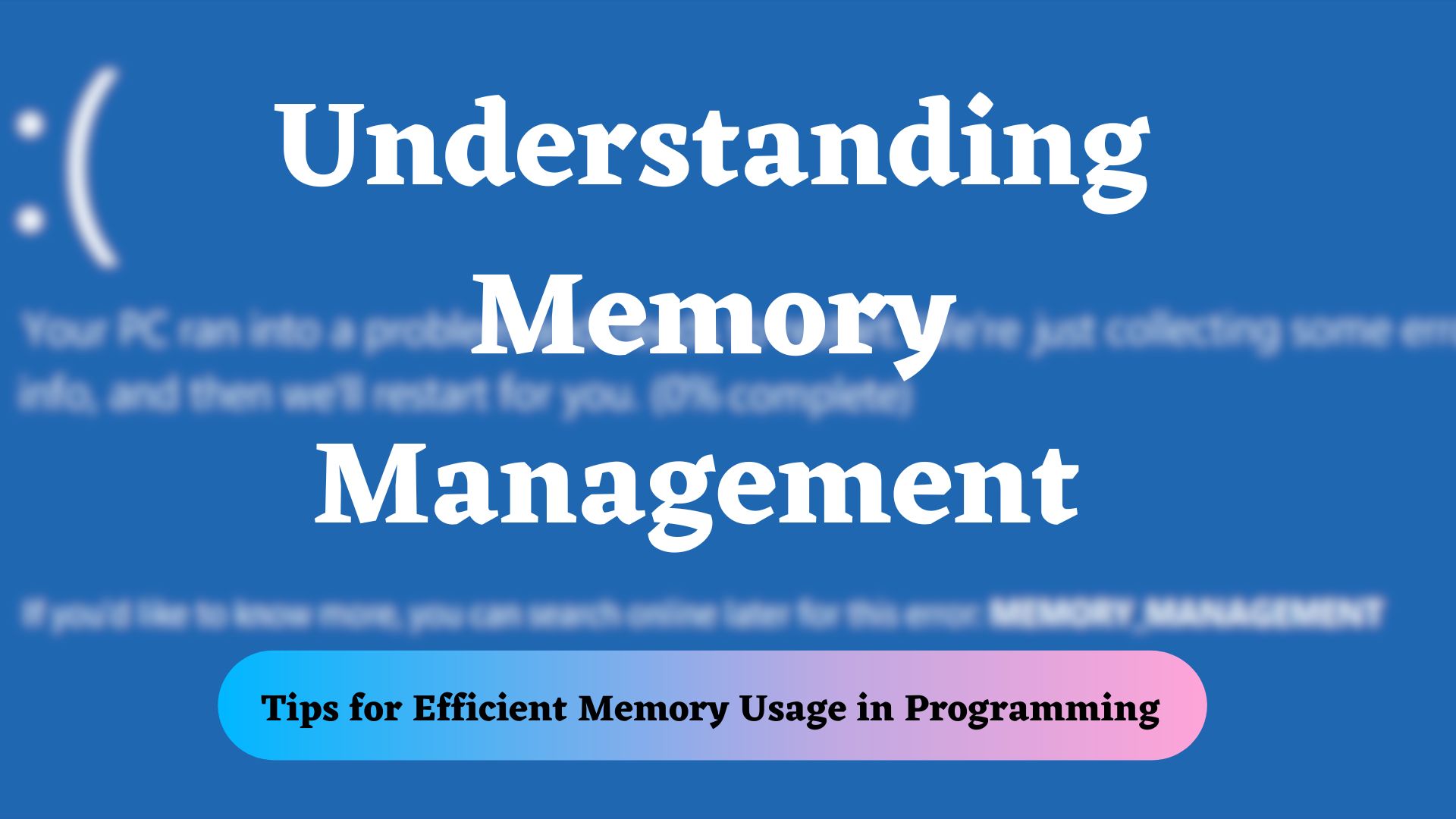Memory management is a crucial aspect of programming that directly impacts the efficiency and performance of software applications. Understanding how memory is allocated, used, and released is essential for developers to ensure optimal resource utilization. In this article, we will delve into the world of memory management, exploring different types of memory, common issues and challenges, and various strategies for efficient memory usage. We will also discuss best practices, debugging techniques, and useful tools to help programmers navigate memory-related problems efficiently. By the end, you will have a solid understanding of memory management principles and tips to enhance memory usage in your programming endeavors.
Introduction to Memory Management in Programming
What is Memory Management?
In the world of programming, memory management is like the behind-the-scenes hero that ensures your applications run smoothly. It involves the management and allocation of computer memory to different programs or processes.
Think of memory management as a librarian who organizes the limited space in the library (your computer’s memory) and assigns books (data) to different borrowers (programs) according to their needs. This helps prevent conflicts and maximizes the efficient use of resources.
Importance of Efficient Memory Usage
Efficient memory usage is crucial for the performance and stability of any software application. When programs use too much memory or fail to release memory when it’s no longer needed, it can lead to slowdowns, crashes, or even the dreaded “out of memory” errors.
Wasting memory is like hoarding books you’ll never read or keeping borrowed ones long after you’re done. It’s not only inefficient but also selfish, as it prevents others from accessing the resources they need. By optimizing memory usage, you can improve the overall efficiency and responsiveness of your programs.
Types of Memory in Programming
Stack Memory
Stack memory is where functions and local variables live. It’s like a temporary scratchpad that grows and shrinks as functions are called and return. Imagine it as a stack of Post-it notes, where you can only use the topmost one.
Heap Memory
Heap memory, on the other hand, is a larger and more flexible space where programs can allocate memory dynamically during runtime. It’s like a playground where you can build sandcastles of any size and shape. But beware, it requires manual cleanup when you’re done playing.
Global Memory
Global memory is like the shared pantry of your program, where variables and data are stored that can be accessed by multiple functions or modules. It’s a convenient storage solution but, like any communal space, needs careful management to avoid chaos and conflicts.
Common Memory Management Issues and Challenges
Memory Leaks
Memory leaks occur when your program allocates memory but fails to release it properly. It’s like buying a new book but forgetting to return the old ones to the library. Over time, these leaked memory blocks can accumulate, leading to a shortage of available memory and potential crashes.
Dangling Pointers
Dangling pointers are dangerous little creatures. They occur when you have a pointer that references a memory location that has been deallocated or freed. It’s like having a map that leads you to a nonexistent treasure. Accessing a dangling pointer can cause unexpected behavior and crashes.
Fragmentation
Fragmentation is like a jigsaw puzzle where the pieces of memory, although available, are scattered and not contiguous. This can limit the usage of larger blocks of memory even if there’s enough total memory available. It’s like needing a large table but only finding scattered tiny ones.
Strategies for Efficient Memory Usage
Dynamic Memory Allocation
Dynamic memory allocation allows you to request memory from the heap during runtime, giving you more flexibility. Just remember to clean up after yourself by releasing the memory when you’re done using it. It’s like renting a beach umbrella for a day and returning it before heading home.
Proper Deallocation
Proper deallocation is essential to prevent memory leaks. Always match every allocation with a corresponding deallocation. It’s like returning all the borrowed books to the library when you’re finished, making them available to other eager readers.
Use of Data Structures and Algorithms
Choosing the right data structures and algorithms can help minimize memory usage. By selecting efficient structures and algorithms tailored to your specific needs, you can optimize memory usage and reduce unnecessary overhead. It’s like organizing your books on sturdy shelves and using a catalog system to find them quickly.
So remember, efficient memory management is the key to building reliable and high-performing software. So go forth, code responsibly, and keep those programs running smoothly like a well-managed library!
Memory Management Techniques and Best Practices
Memory Pools
Memory pools are like the VIP lounges of memory allocation. Instead of making frequent trips to the memory bank, memory pools allow you to preallocate a chunk of memory and divvy it up as needed. It’s like reserving a table for your friends at a crowded restaurant, ensuring you all have a cozy spot without the hassle of waiting in line. By reducing the overhead of memory allocation and deallocation, memory pools can significantly improve performance and minimize fragmentation.
Smart Pointers
Smart pointers are the Sherlock Holmes of memory management—they solve the mystery of memory leaks. These clever little pointers automatically deallocate memory when it’s no longer in use, making your life as a programmer much easier. It’s like having a personal assistant who cleans up after you, so you can focus on the more exciting detective work. Smart pointers come in various forms, such as unique_ptr, shared_ptr, and weak_ptr, each with its own set of superpowers to suit different scenarios.
Garbage Collection
Garbage collection is the Marie Kondo of memory management—it helps you declutter your program by sweeping away objects you no longer need. With garbage collection, you don’t have to worry about manually freeing memory or keeping track of every object’s lifespan. It’s like having a magical cleaning fairy that tidies up your code while you sip on a cup of tea. However, be aware that garbage collection can introduce some performance overhead, so use it judiciously.
Debugging and Troubleshooting Memory Issues
Memory Profiling
Memory profiling is like peering into a microscope to examine the inner workings of your program’s memory consumption. It helps you identify memory leaks, excessive memory usage, and other memory-related problems. It’s like being a detective with a magnifying glass, scrutinizing every object to catch the culprit. By using memory profiling tools, you can spot memory hogs and optimize your code to minimize memory-related issues.
Memory Analysis Tools
Memory analysis tools are like the personal trainers for your code—they help you whip it into shape. These tools analyze your program’s memory behavior, detect memory leaks, and optimize memory usage. It’s like having a gym buddy who pushes you to shed those extra bytes and build leaner, meaner code. With memory analysis tools, you can navigate through the maze of memory management and resolve issues before they become major headaches.
Common Debugging Techniques
When it comes to debugging memory issues, a little Sherlock Holmes intuition goes a long way. Many common techniques can help you sleuth out memory problems, such as checking for null pointers, freeing memory appropriately, and avoiding dangling pointers. It’s like playing a game of memory whack-a-mole, where you uncover and fix bugs one by one. With a combination of patience, perseverance, and a dash of caffeine, you can conquer even the trickiest memory bugs.
Memory Management Tools and Resources
Memory Profilers
Memory profilers are your trusty sidekicks in the battle against memory-related troubles. These tools help you analyze memory usage, track allocations and deallocations, and identify potential memory leaks. It’s like having a memory-focused personal assistant who keeps an eye on your program’s memory hygiene. Some popular memory profilers include Valgrind, Instruments, and Visual Studio’s Memory Profiler.
Memory Analyzers
Memory analyzers are the Swiss Army knives of memory troubleshooting—they provide a comprehensive set of tools to diagnose memory-related issues. These tools can help you identify memory leaks, analyze memory allocations, and track down the root causes of memory problems. It’s like having a versatile toolbox that equips you with everything you need to conquer memory issues. Some well-known memory analyzers include Eclipse MAT, JetBrains dotMemory, and Microsoft’s WinDbg.





